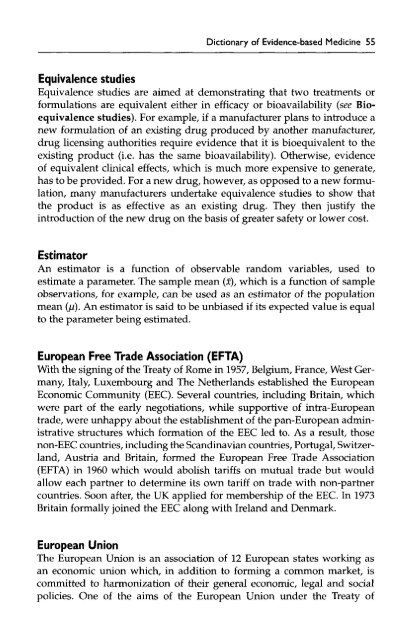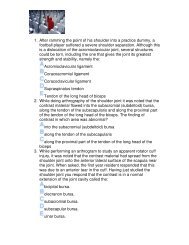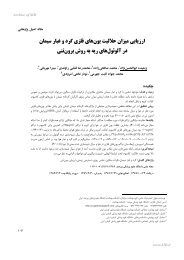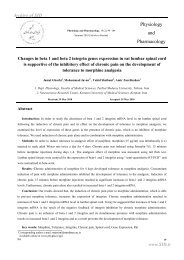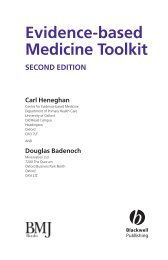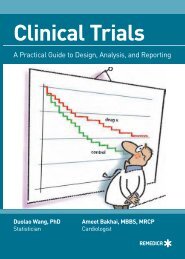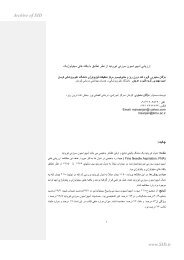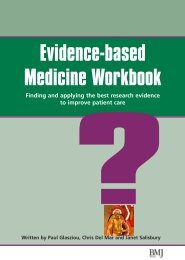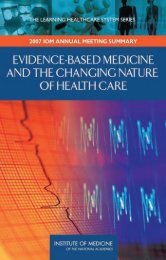Dictionary of Evidence-based Medicine.pdf
Dictionary of Evidence-based Medicine.pdf
Dictionary of Evidence-based Medicine.pdf
You also want an ePaper? Increase the reach of your titles
YUMPU automatically turns print PDFs into web optimized ePapers that Google loves.
<strong>Dictionary</strong> <strong>of</strong> <strong>Evidence</strong>-<strong>based</strong> <strong>Medicine</strong> 55<br />
Equivalence studies<br />
Equivalence studies are aimed at demonstrating that two treatments or<br />
formulations are equivalent either in efficacy or bioavailability (see Bioequivalence<br />
studies). For example, if a manufacturer plans to introduce a<br />
new formulation <strong>of</strong> an existing drug produced by another manufacturer,<br />
drug licensing authorities require evidence that it is bioequivalent to the<br />
existing product (i.e. has the same bioavailability). Otherwise, evidence<br />
<strong>of</strong> equivalent clinical effects, which is much more expensive to generate,<br />
has to be provided. For a new drug, however, as opposed to a new formulation,<br />
many manufacturers undertake equivalence studies to show that<br />
the product is as effective as an existing drug. They then justify the<br />
introduction <strong>of</strong> the new drug on the basis <strong>of</strong> greater safety or lower cost.<br />
Estimator<br />
An estimator is a function <strong>of</strong> observable random variables, used to<br />
estimate a parameter. The sample mean (*), which is a function <strong>of</strong> sample<br />
observations, for example, can be used as an estimator <strong>of</strong> the population<br />
mean (/j). An estimator is said to be unbiased if its expected value is equal<br />
to the parameter being estimated.<br />
European Free Trade Association (EFTA)<br />
With the signing <strong>of</strong> the Treaty <strong>of</strong> Rome in 1957, Belgium, France, West Germany,<br />
Italy, Luxembourg and The Netherlands established the European<br />
Economic Community (EEC). Several countries, including Britain, which<br />
were part <strong>of</strong> the early negotiations, while supportive <strong>of</strong> intra-European<br />
trade, were unhappy about the establishment <strong>of</strong> the pan-European administrative<br />
structures which formation <strong>of</strong> the EEC led to. As a result, those<br />
non-EEC countries, including the Scandinavian countries, Portugal, Switzerland,<br />
Austria and Britain, formed the European Free Trade Association<br />
(EFTA) in 1960 which would abolish tariffs on mutual trade but would<br />
allow each partner to determine its own tariff on trade with non-partner<br />
countries. Soon after, the UK applied for membership <strong>of</strong> the EEC. In 1973<br />
Britain formally joined the EEC along with Ireland and Denmark.<br />
European Union<br />
The European Union is an association <strong>of</strong> 12 European states working as<br />
an economic union which, in addition to forming a common market, is<br />
committed to harmonization <strong>of</strong> their general economic, legal and social<br />
policies. One <strong>of</strong> the aims <strong>of</strong> the European Union under the Treaty <strong>of</strong>


